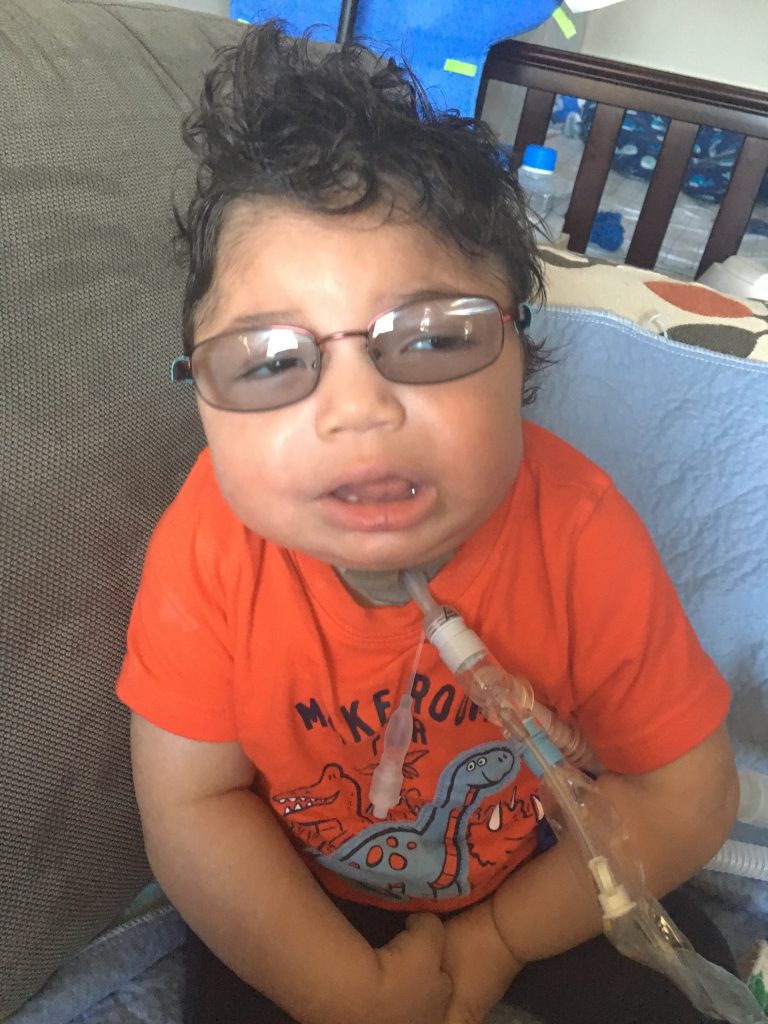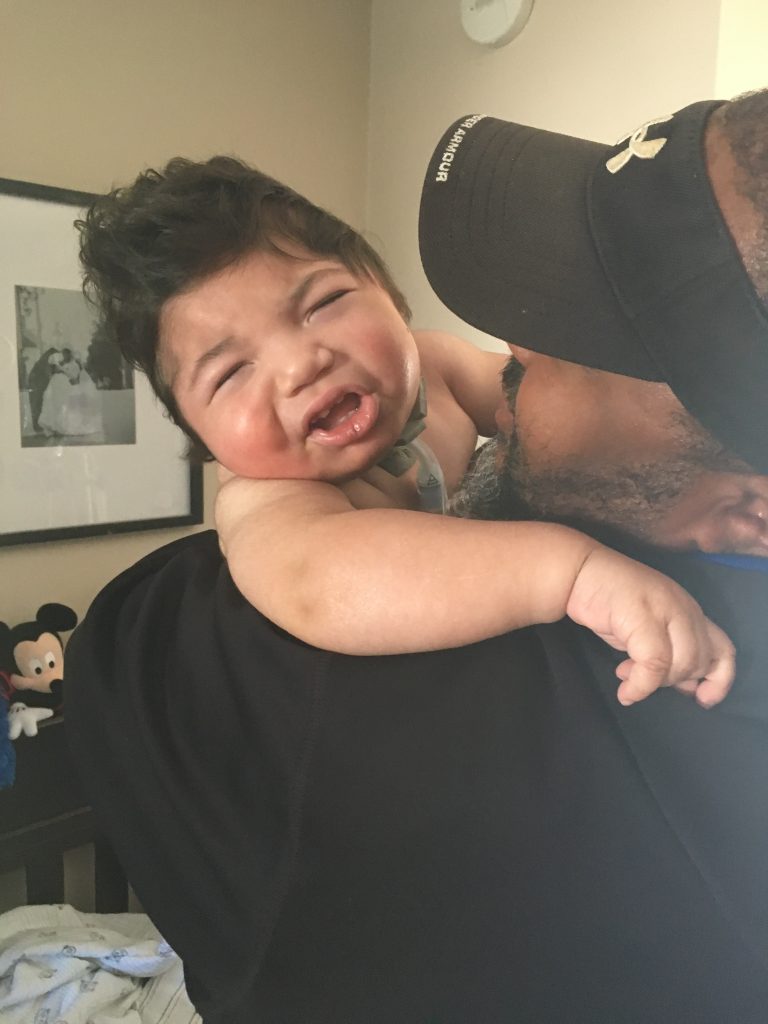Theme: Tracheostomy
First published on Patient Worthy.
There were so many anxious years leading up to this moment. Thoughts of this impossible decision rattled around my brain and squeezed my heart for years. And now the day had finally come.
Kept company by a small dim light in the back corner of our PICU room and the hum of the bipap ventilator, I was frantically making a pros and cons list of what my son Bubba’s life would be like should we pursue a tracheostomy. Desperately trying to recall all the information given to me by our specialists, I felt like I was sinking due to the weight of a seemingly impossible decision. I laid down – a vain attempt to surrender to the mental exhaustion. Pulling the blankets back over my head, I quickly found myself rolling over on my side, retrieving my phone and diving back into exploring the options for a tracheostomy.
In the years leading up to this day, Bubba’s respiratory status had been declining. Bubba was born with a rare neurological condition, Neuronal Migration Disorder with Cortical Malformation, which had greatly affected his muscle tone and subsequently his respiratory system. For years as I watched Bubba grow, I also watched how respiratory illnesses were becoming more gruesome and day to day activities brought on significant breathing problems. When our specialists started to drop subtle hints that a tracheostomy could be in Bubba’s best interest, I knew I needed to begin preparing for the decision day.
A tracheostomy seems like an easy, no-brainer, almost “easy button” decision when your child is faced with airway obstruction and a progression of their condition. When the tracheostomy talk started to appear on our radar, I soon realized the decision for a tracheostomy was far more complicated than I had ever realized. Being a seeker of valuable input, I spoke with friends whose own children had tracheostomies to learn what the care and their day to day looked like. I knew I also needed the advice of a trusted medical professional to explore the myriad of questions circulating in my brain. Bubba’s neurologist had a deep understanding of who my son was as a person, his finicky medical complications and our values as a family. As parents, we often seek the “expert opinion” and in this case I was desperate to have that from Bubba’s neurologist. In her honesty, she shared her reservations about how a tracheostomy might contribute to Bubba’s quality of life. In my heart, I had similar reservations too and hearing the same worry reflected from our trusted neurologist shaped my mindset for the looming tracheostomy decision: it was a hard no.
But here I was, a year later debating the decision all over again. I knew I needed yet another opinion. I sought out the opinion of two otolaryngologists and wondered if their opinions would be the same. Both doctor’s findings were identical: Bubba’s airway was collapsing, and his lung function was declining. The doctors offered options rather than opinions – a tracheostomy or keep Bubba on bipap ventilator. They explained a tracheostomy would provide a stable airway, but there was no indication that it would prevent further airway collapse below the tracheostomy and it wouldn’t reverse his disease progression. The less invasive option of bipap ventilation provided less risk, but the medical team was certain that with that choice Bubba would only be left with a few months to live. Furthermore, Bubba’s entire medical team was unsure if his body would recover from surgery and be able to ever wake up again from sedation. As I tossed and turned on the hospital couch bed, tears filled my eyes. I felt no matter what decision I made, it still meant Bubba faced significant decline in his condition and likely the end of life. I was overwhelmed with a feeling of defeat.
opinion of two otolaryngologists and wondered if their opinions would be the same. Both doctor’s findings were identical: Bubba’s airway was collapsing, and his lung function was declining. The doctors offered options rather than opinions – a tracheostomy or keep Bubba on bipap ventilator. They explained a tracheostomy would provide a stable airway, but there was no indication that it would prevent further airway collapse below the tracheostomy and it wouldn’t reverse his disease progression. The less invasive option of bipap ventilation provided less risk, but the medical team was certain that with that choice Bubba would only be left with a few months to live. Furthermore, Bubba’s entire medical team was unsure if his body would recover from surgery and be able to ever wake up again from sedation. As I tossed and turned on the hospital couch bed, tears filled my eyes. I felt no matter what decision I made, it still meant Bubba faced significant decline in his condition and likely the end of life. I was overwhelmed with a feeling of defeat.
As the sun rose the next morning, I quickly got myself ready and was determined to make the decision. Pushing up a chair beside Bubba’s bed, I studied him as he still slept. The bipap ventilation mask covered his entire face, but he seemed comfortable. The days prior, Bubba had required his bipap mask almost constantly as he would desat quickly once it was removed. As I grasped Bubba’s hand in mine, I felt a bit more clarity, I couldn’t send Bubba into a surgery without absolute certainty he would come out on the other side with a better quality of life. Furiously, I dove back into researching the options for a tracheostomy before Bubba’s team arrived for morning rounds. Thankfully, the day before my palliative care team reminded me of the resources on Courageous Parents Network. I read through the tracheostomy decision guide and reflected on Bubba and our life together. I explored the videos and connected immediately with the parents who chose not to proceed with a tracheostomy for their child. Being able to hear from another parent who faced the similar impossible dilemma and was choosing to forgo the “easy button” solution was comforting to me.
In the end, I realized that choosing to pursue a tracheostomy wasn’t giving up on Bubba. By not choosing a tracheostomy, I was choosing the path that honored who he was and the life we had built. This decision was not made from fear, but out of love, deep reflection and an understanding that more intervention does not always correlate to more life.
Although it was one of the most difficult decisions I’ve ever had to make, I eventually found peace in knowing that I was no longer acting out of desperation. Instead, I moved forward with the confidence that this was what Bubba truly needed—comfort, dignity, and the unwavering presence of a mother attuned to both her child’s needs and her own inner guidance. The anxiety that had weighed on me for years didn’t vanish entirely, but it was eased by the clarity and love that came with the decision. In that space, I was able to simply be with Bubba—holding his hand, loving him deeply, and continuing our journey together.
 Blair Young-Whitworth is a devoted mother, corporate professional, and passionate advocate for children with complex medical needs. She is the mother of two children, including her beloved son Bubba, who was born with a rare neurological condition—neuronal migration disorder with cortical malformation due to a MED13 gene mutation. Bubba passed away in 2024 at the age of 10, leaving a lasting impact on all who knew him. In his memory, Blair continues to channel her love and experience into advocacy, working with Courageous Parents Network as a Parent Champion to support and empower other families facing similar journeys. In addition to her role in the corporate world, she dedicates her time to government advocacy and is a Lay Educational Advocate, helping families navigate the special education system.
Blair Young-Whitworth is a devoted mother, corporate professional, and passionate advocate for children with complex medical needs. She is the mother of two children, including her beloved son Bubba, who was born with a rare neurological condition—neuronal migration disorder with cortical malformation due to a MED13 gene mutation. Bubba passed away in 2024 at the age of 10, leaving a lasting impact on all who knew him. In his memory, Blair continues to channel her love and experience into advocacy, working with Courageous Parents Network as a Parent Champion to support and empower other families facing similar journeys. In addition to her role in the corporate world, she dedicates her time to government advocacy and is a Lay Educational Advocate, helping families navigate the special education system.
Theme: Tracheostomy
I like questions.
I like asking questions.
I like answering questions.
I’ve been known to ask many questions, some not always necessary but I like the affirmation of knowing I knew the answer. Or the gift of learning something new.
 Seven years ago, just 7 months before Quinlan died, I started a list of questions that previously I never would have imagined I would need to ask or have answered (some that still remain answer-less 10 years later). Questions that include words I didn’t even know existed. And many are questions that no parent should ever have to ask.
Seven years ago, just 7 months before Quinlan died, I started a list of questions that previously I never would have imagined I would need to ask or have answered (some that still remain answer-less 10 years later). Questions that include words I didn’t even know existed. And many are questions that no parent should ever have to ask.
Recently, I reread the list of questions and found myself comforted in a way as they transported me back to a time when Quinlan was alive – when we had naive hope. As scary as this time was, it was the only life we knew. It was the only life we knew with Quinlan.
The list continues but now since Quinlan’s death includes questions like:
“How do I make sure my younger son who never met his older brother feels connected to him?”
“How can I help other parents as a bereaved parent myself?”
“How do I make sure Quinlan’s legacy continues through us?”
I thought that by sharing, others may read these questions and feel connected or even safe knowing that they have asked these same types of questions.
Living a life with a medically complex child or child with a rare disease often comes with more questions than answers. Sometimes writing them down and being able to see for yourself just how much you’re learning, how much you’re growing, and how much you’re advocating for the ones you love is a remarkable thing, even when it’s not something you ever wanted to do or expected to do in your life.
Post script: These are the questions I generated over the two and a half years of my son’s life.
- What is tense muscle tone?
- Why is my 24 hour old son getting an MRI?
- What do these machines do?
- What are all these beeping sounds?
- What did the MRI show?
- When can my son leave the NICU?
- Why is his body temperature so cold?
- Why is his mouth blue?
- Why is he having seizures?
- Will the spinal tap hurt him?
- Will the EEG hurt him?
- Will these medications have any side effects?
- Will he ever walk?
- Will he ever talk?
- How many more EEG’s will he need to have?
- How do we use this feeding pump?
- Will the breathing tube hurt him?
- Why is he on a paralytic?
- How many seizures did he have today?
- How many more days will he need to be on this antibiotic?
- When can we hold him again?
- Will the trach be beneficial in the long run?
- How often do I change his trach?
- Why can’t he sit up?
- Who’s the nurse working with him tonight?
- Was he awake enough for therapy today?
- How do his lungs sound today?
- When can he come home?
- How many hours of nursing will we get a week?
- How do you suction?
- Why is his heart rate so high?
- Why is he only SATing at 80%?
- Why is Quinlan on precautions?
- How many liters of oxygen is he on?
- What is Brat1?
- What are the chances another child of ours will have the same genetic mutation?
- Are we emotionally ready to have more children?
- When will the ambulance be here to bring him home?
- How do I set up all these machines in the house?
- Who is the nurse (aka stranger) coming to stay at our house tonight so we can attempt to sleep?
- Why did the nurse call out tonight?
- How am I supposed to stay awake all night after working all day to make sure he doesn’t have a seizure or miss any of his medications?
- Did he have to go on any oxygen today?
- What is his PEEP set to now?
- How are the granulomas around his stoma looking?
- Do I trust this person to change his trach in the case of an emergency?
- How many ketones showed up on his test?
- Will the keppra cause any issues with the trileptal which will cause issues with the topamax which could cause issues with the onfi which could cause issues with the Dilantin and could cause issues with the phenobarbital?
- Who is the doctor on call when we bring him into the ER again?
- Should I pack another overnight bag?
- Can I take more time off of work while Quinlan is still in the hospital?
- How do I say goodbye to him?
- How do we go about donating his brain to research so this won’t happen to any other family?
Theme: Tracheostomy
Theme: Tracheostomy
CPN invites parents into the Zoom Room to learn and listen as well as question the aspects of tracheostomy. Your child is unique and you deserve the opportunity to consider the options to improve your child’s body’s ability to breathe in the context of their illness, your hopes and your family situation. Considering the Before, During and After will help educate you, alleviate your anxiety and lead to informed decision-making.
Theme: Tracheostomy
Theme: Tracheostomy
Theme: Tracheostomy
Cuando su hijo/a tiene necesidades médicas complejas y un diagnóstico de una enfermedad seria, sus multiples especialistas puede que ofrescan opciones de tratamiento y opiniones diferentes. Es normal sentirse abrumado por esto, especialmente si el procedimiento siendo recomendado es uno que cambia la vida. La Traqueotomía es uno de estos. Este guía está diseñado para ayudar a tener conversaciones entre las familias y los proveedores médicos, con más información, cuando se está considerando una traqueotomía. Como con la mayoría de las decisiones complejas, padres y proveedores tienen que trabajar en conjunto para que usted pueda entender totalmente todos los componentes del procedimiento, y los resultados proyectados a largo plazo y los potenciales efectos en el día a día de su hijo/a y familia. Es importante obtener informaciónde todos los miembros del equipo médico, para que usted pueda entender como la intervención va a afectar a los otros sistemas de su hijo/a y los objetivos del tratamiento para la familia. Con la esperanza de que estas conversaciones y la toma de la decisión se puedan llevar a cabo a través del tiempo, dándole a usted la oportunidad de recopilar información y hacer preguntas. Cuando no hay obviamente una opción correcta, todo se trata del proceso de como se toma la decisión. (
Theme: Tracheostomy
Theme: Tracheostomy
Theme: Tracheostomy
Theme: Tracheostomy
Theme: Tracheostomy
In this Zoom interview with CPN, Michelle — mother of Alex (age 7) and Julianna, who had a severe form of Charcot-Marie-Tooth disease and died at age 5 — describes all the reasons they opted not to get a trach for Julianna: her love of talking, the potential complications; the lack of a guarantee; BiPap was working; her condition was progressive.
